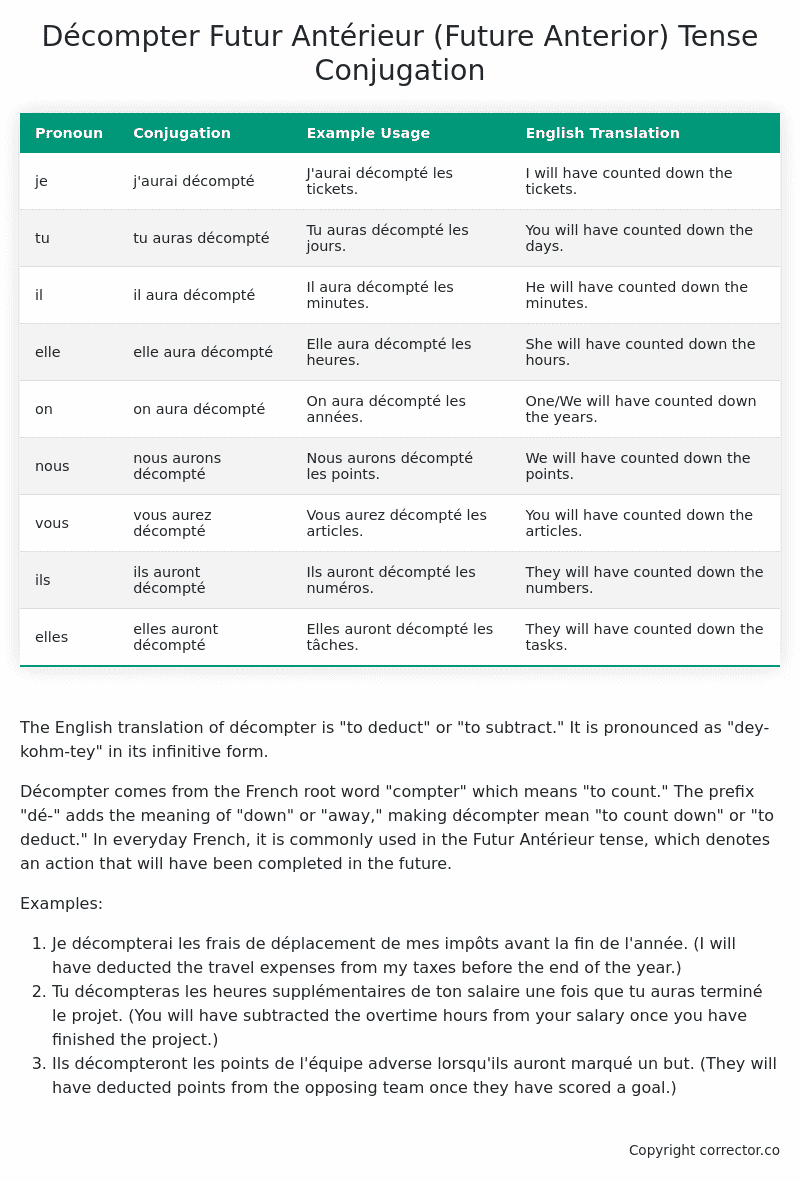Futur Antérieur (Future Anterior) Tense Conjugation of the French Verb décompter
Introduction to the verb décompter
The English translation of décompter is “to deduct” or “to subtract.” It is pronounced as “dey-kohm-tey” in its infinitive form.
Décompter comes from the French root word “compter” which means “to count.” The prefix “dé-” adds the meaning of “down” or “away,” making décompter mean “to count down” or “to deduct.” In everyday French, it is commonly used in the Futur Antérieur tense, which denotes an action that will have been completed in the future.
Examples:
- Je décompterai les frais de déplacement de mes impôts avant la fin de l’année. (I will have deducted the travel expenses from my taxes before the end of the year.)
- Tu décompteras les heures supplémentaires de ton salaire une fois que tu auras terminé le projet. (You will have subtracted the overtime hours from your salary once you have finished the project.)
- Ils décompteront les points de l’équipe adverse lorsqu’ils auront marqué un but. (They will have deducted points from the opposing team once they have scored a goal.)
Table of the Futur Antérieur (Future Anterior) Tense Conjugation of décompter
| Pronoun | Conjugation | Example Usage | English Translation |
|---|---|---|---|
| je | j’aurai décompté | J’aurai décompté les tickets. | I will have counted down the tickets. |
| tu | tu auras décompté | Tu auras décompté les jours. | You will have counted down the days. |
| il | il aura décompté | Il aura décompté les minutes. | He will have counted down the minutes. |
| elle | elle aura décompté | Elle aura décompté les heures. | She will have counted down the hours. |
| on | on aura décompté | On aura décompté les années. | One/We will have counted down the years. |
| nous | nous aurons décompté | Nous aurons décompté les points. | We will have counted down the points. |
| vous | vous aurez décompté | Vous aurez décompté les articles. | You will have counted down the articles. |
| ils | ils auront décompté | Ils auront décompté les numéros. | They will have counted down the numbers. |
| elles | elles auront décompté | Elles auront décompté les tâches. | They will have counted down the tasks. |
Other Conjugations for Décompter.
Le Present (Present Tense) Conjugation of the French Verb décompter
Imparfait (Imperfect) Tense Conjugation of the French Verb décompter
Passé Simple (Simple Past) Tense Conjugation of the French Verb décompter
Passé Composé (Present Perfect) Tense Conjugation of the French Verb décompter
Futur Simple (Simple Future) Tense Conjugation of the French Verb décompter
Futur Proche (Near Future) Tense Conjugation of the French Verb décompter
Plus-que-parfait (Pluperfect) Tense Conjugation of the French Verb décompter
Passé Antérieur (Past Anterior) Tense Conjugation of the French Verb décompter
Futur Antérieur (Future Anterior) Tense Conjugation of the French Verb décompter (this article)
Subjonctif Présent (Subjunctive Present) Tense Conjugation of the French Verb décompter
Subjonctif Passé (Subjunctive Past) Tense Conjugation of the French Verb décompter
Subjonctif Imparfait (Subjunctive Imperfect) Tense Conjugation of the French Verb décompter
Subjonctif Plus-que-parfait (Subjunctive Pluperfect) Tense Conjugation of the French Verb décompter
Conditionnel Présent (Conditional Present) Tense Conjugation of the French Verb décompter
Conditionnel Passé (Conditional Past) Tense Conjugation of the French Verb décompter
L’impératif Présent (Imperative Present) Tense Conjugation of the French Verb décompter
L’infinitif Présent (Infinitive Present) Tense Conjugation of the French Verb décompter
Struggling with French verbs or the language in general? Why not use our free French Grammar Checker – no registration required!
Get a FREE Download Study Sheet of this Conjugation 🔥
Simply right click the image below, click “save image” and get your free reference for the décompter Futur Antérieur tense conjugation!

Décompter – About the French Futur Antérieur (Future Anterior) Tense
Construction
Common Everyday Usage Patterns
Interactions with Other Tenses
For example
Summary
I hope you enjoyed this article on the verb décompter. Still in a learning mood? Check out another TOTALLY random French verb conjugation!


